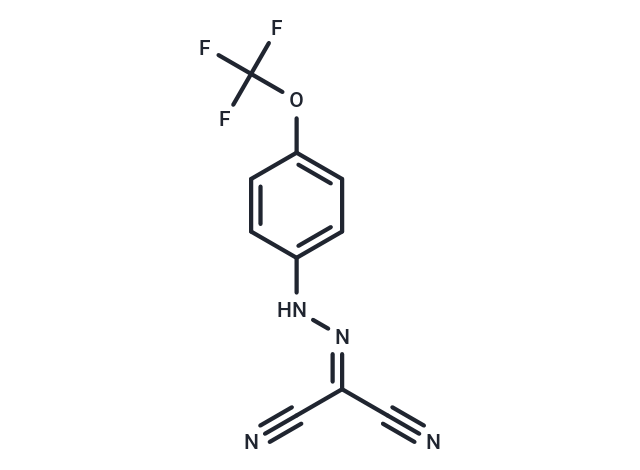Shopping Cart
- Remove All
 Your shopping cart is currently empty
Your shopping cart is currently empty

FCCP (Trifluoromethoxy carbonylcyanide phenylhydrazone) is an oxidative phosphorylation (OXPHOS) inhibitor and mitochondrial proton carrier uncoupler. FCCP is often used as an apoptosis inducer.

| Pack Size | Price | Availability | Quantity |
|---|---|---|---|
| 5 mg | $36 | In Stock | |
| 10 mg | $51 | In Stock | |
| 25 mg | $92 | In Stock | |
| 50 mg | $166 | In Stock | |
| 100 mg | $310 | In Stock | |
| 200 mg | $518 | In Stock | |
| 500 mg | $828 | Backorder | |
| 1 mL x 10 mM (in DMSO) | $50 | In Stock |
| Description | FCCP (Trifluoromethoxy carbonylcyanide phenylhydrazone) is an oxidative phosphorylation (OXPHOS) inhibitor and mitochondrial proton carrier uncoupler. FCCP is often used as an apoptosis inducer. |
| In vitro | METHODS: Rat ventricular myocytes were treated with FCCP (10-1000 nM) for 1400 sec, and cellular oxygen consumption was measured using a Clark Oxygen Electrode. RESULTS: Oxygen consumption increased significantly, immediately, and in a dose-dependent manner after the addition of FCCP. [1] METHODS: Rat adrenal medullary chromaffinoma cells PC12 were treated with FCCP (30 µM) for 0.5-2 h. The rate of protein synthesis was measured using [3H]methionine. RESULTS: FCCP treatment produced a strong inhibition (68%) of protein synthesis rate for at least 2 hours. [2] |
| In vivo | METHODS: To test the effect on stroke, FCCP (1 mg/kg) was injected intraperitoneally into a C57BL/6J mouse model of stroke, followed by one hour of transient middle cerebral artery occlusion (tMCAO). RESULTS: Infarct volumes in the cortex, striatum, and whole hemisphere were significantly increased in mice pretreated with FCCP. Mice receiving FCCP had significantly increased neurologic deficit scores compared to carriers. [3] METHODS: To assay anti-tumor activity in vivo, FCCP (1 mg/kg) and cisplatin (2 mg/kg) were intraperitoneally injected every two days for two weeks into C57BL/6 mice harboring mouse ovarian epithelial carcinoma tumor ID8. RESULTS: The combination of FCCP and cisplatin inhibited tumor growth via OMA1-induced mitochondrial and ER stress. [4] |
| Cell Research | Protein synthesis rate is assayed in 24-mm diameter multi-well dishes with fresh medium containing 0.175 Ci/mmol of [3H]methionine (200 μM), for 30 min at 37°C. PC12 cells are treated with FCCP for different period of times. (Only for Reference) |
| Alias | Trifluoromethoxy carbonylcyanide phenylhydrazone, Carbonyl cyanide 4-(trifluoromethoxy)phenylhydrazone |
| Molecular Weight | 254.17 |
| Formula | C10H5F3N4O |
| Cas No. | 370-86-5 |
| Smiles | FC(F)(F)Oc1ccc(NN=C(C#N)C#N)cc1 |
| Relative Density. | 1.34 g/cm3 |
| Storage | Powder: -20°C for 3 years | In solvent: -80°C for 1 year | Shipping with blue ice. | |||||||||||||||||||||||||
| Solubility Information | 10% DMSO+40% PEG300+5% Tween 80+45% Saline: 2.54 mg/mL (9.99 mM), In vivo: Please add the solvents sequentially, clarifying the solution as much as possible before adding the next one. Dissolve by heating and/or sonication if necessary. Working solution is recommended to be prepared and used immediately. DMSO: 55 mg/mL (216.39 mM), Sonication is recommended. | |||||||||||||||||||||||||
Solution Preparation Table | ||||||||||||||||||||||||||
DMSO
| ||||||||||||||||||||||||||

Copyright © 2015-2025 TargetMol Chemicals Inc. All Rights Reserved.